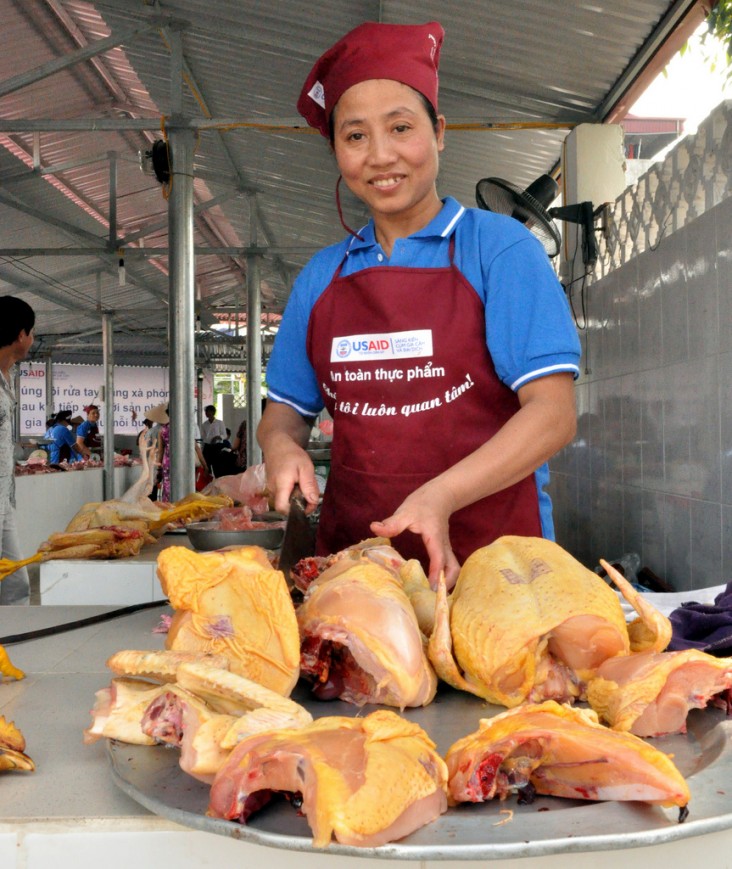
For Immediate Release
HANOI, August 6, 2013 -- Key training and demonstration models have reached thousands of human and animal health workers and poultry farmers across Vietnam to help detect and control disease as part of the U.S. Agency for International Development's Avian and Pandemic Influenza Initiative (USAID/APII).
In a meeting today marking a milestone in Vietnam's fight against avian influenza, the USAID/APII project showcased results over the past four years and turned over its models to Vietnamese partners to continue in dozens of provinces throughout the country.
"We expect all of our partners to continue to work together through the One Health approach linking human and animal health professionals to reduce the risks from avian and pandemic influenza and other emerging infectious diseases," said USAID Office of Health Director Laurel Fain. "With known threats such as H5N1 still endemic in parts of Vietnam and emerging threats like H7N9 requiring a timely initial response, the importance of adopting these best practices now will help ensure a safer, healthier and more prosperous Vietnam in the years ahead."
The USAID/APII project, which ends next month, has been an integral part of U.S. government assistance to efforts led by the Government of Vietnam that have seen the dangerous new H5N1 strain of avian influenza brought largely under control in poultry and new human cases all but eliminated. Central and provincial health and agriculture authorities, civil society organizations and the private sector have adopted models developed by the project, which provide practical, effective and affordable options for reducing the risk of avian influenza and other emerging infectious diseases in animals and humans.
In 2012, the Ministry of Health (MOH) officially adopted the training program on infection control developed by the project. As of July 2013, 37 provinces have prepared training plans to deliver this training program to healthcare workers in provincial and district public and private healthcare facilities. Twenty medical and nursing schools have also adopted the training program. In line with the National Action Plan on Strengthening Infection Control in Health Care Facilities to 2015 adopted by the MOH in March, more than 17,000 healthcare workers will complete the training program in the coming two years.
The project has supported field animal health workers with the basic knowledge, skills and tools they need to detect and report avian influenza and other potentially dangerous animal diseases. In October 2012, almost 7,000 copies of the project's field animal health worker training manual were sent to 63 provincial Sub-Departments of Animal Health and more than 700 District Veterinary Stations nationwide, together with electronic copies on CD. As of July 2013, provincial veterinary authorities have used the manual to train provincial, district and commune veterinary officials and animal health workers in 12 provinces in three of the country's regions.
"Through reviewing the materials, we found the Training material for Field Animal Health Workers contains very interesting information and practical content, is comprehensive and easy to understand and can be used to train and strengthen the field animal health network," said Mr. Le Thanh Tung, Head of the Vinh Long provincial Sub-Department of Animal Health.
The project's behavior change communications (BCC) training model is now being applied in 15 provinces. Initially designed to address prevention of avian influenza and other emerging infectious diseases, the BCC model now applies to a wide range of other issues, including environmental sanitation, women's and children's health and parenting skills. The Vietnam Farmer's Union has also adopted the BCC training model in 28 vocational training colleges nationwide.
Central and provincial health and agriculture authorities, civil society organizations and the private sector are also applying other models developed by the project. These address separation of live poultry in public markets, biosecurity training for poultry farmers through the agricultural extension system and improved safety in small-scale and centralized poultry slaughtering facilities. They also cover veterinary inspection of poultry products, provincial pandemic preparedness planning and strengthened surveillance of human and animal diseases at the community level.
# # #







Comment
Make a general inquiry or suggest an improvement.